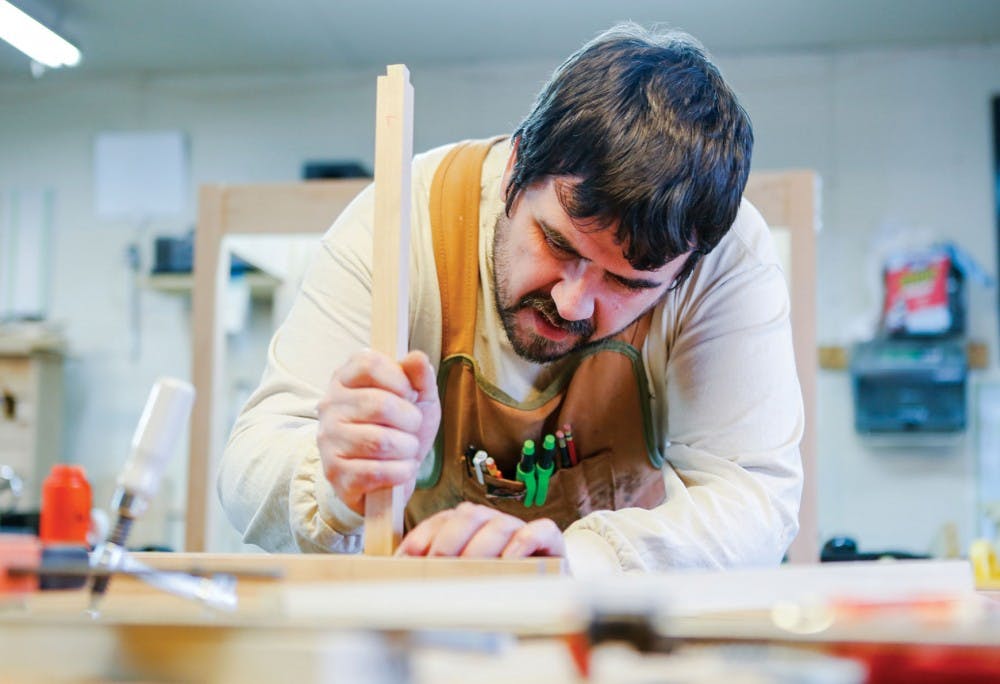One of Ohio University's professors builds and sells his own furniture, which he ships pieces all over the state.
Chris Hedges runs a finger over a raised joint on the wooden table he's working on.
It’s a little uneven, which is a side effect of building furniture with your hands. However, he knows he can remedy the flaw in short time.
“This right here,” Hedges said as he points to the uneven joint. “A machine would have done that perfect, but who cares?”
Hedges said he takes immense pride in building the furniture he sells with minimal help from any woodworking machines, which are faster and more efficient. He has his reasons for sticking with his own two hands, however.
“Handwork can be better than machine work,” Hedges said. “I find satisfaction in pursuing the possibility.”
For the last eight years, Hedges has been building furniture. Having developed an appreciation for fine furniture while growing up around antiques, he decided he wanted to “build something he could pass down to his daughter,” who is now 11.
Hedges, who also teaches sociology at Ohio University, chose to make a dresser for his first project and found that he couldn’t tear himself away from his work.
“I started with the dresser, and much to the dismay of my students, I was calling frequently, canceling class, because I was so engrossed in my project,” Hedges said.
Although Hedges said teaching has grown on him, it never has had the same sense of completion that furniture making has.
“When I was teaching initially, I didn’t feel connected,” he said. “You come in for a class, and then you’re done. (Furniture building) provides me with an opportunity to be involved. I take it from being a tree to its completion.”
Hedges claims the dresser for his daughter was “god-awful,” but that can be hard to believe considering the work he sells now. He recalls his third project — a large, sleek desk, which he was able to sell for $40,000 to a couple in North Carolina.
“It took a year to get them to bite. Their house was full of some of the most amazing furniture I’ve ever seen,” Hedges said. “They’ve since had to move into assisted living. My desk was the only thing they took with them. It’s nice to know that something I’ve created is appreciated.”
Hedges said he also would like to teach classes on furniture building one day. While he hasn’t gotten that far yet, he does have one pupil, Spencer Szturm, who is willing to walk the considerable distance to Hedges' house to learn.
“You take something from a tree and make it into something with your bare hands,” Szturm, a sophomore studying criminal justice, said. “I’ve always wanted to learn a craft. Creating something from the ground up is great.”
Although he has shipped his work as far away as Australia, Hedges said he gets more satisfaction when selling to the local community. He also makes it a point to buy his wood from local places that log in Southeast Ohio.
“I think it’s important to use local resources because I’m a local resource myself,” Hedges said.
{{tncms-asset app="editorial" id="38ab4a1a-bf02-11e5-b868-43f0e976e035"}}
Some students also agree that it’s important for local businesses to support one another.
“Without the support of each other, money will be going to outside resources, which will limit the money flow in Athens,” Brittany Royer, a junior studying psychology, said.
Most of the projects stationed in his workshop, which is his garage, look rather simple, and Hedges said he does that on purpose. Hedges follows a classic form of building called the “Shaker style,” which goes by the notion that there is elegance and beauty in simplicity.
“I don’t build things to only last 10 years,” Hedges said. “I don’t focus on current trends that go away.”
Hedges hopes to one day teach his daughter about woodworking.
“My daughter spends time out here, and she’s interested in what I do,” Hedges said. “I guess I’m a bit romantic in that I think the more I share this knowledge with people the longer it will last.”
@AustinRErickson
ae554013@ohio.edu






